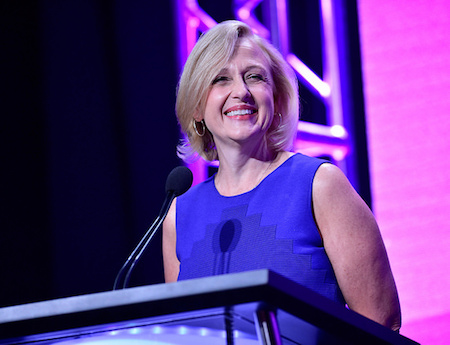TCA: PBS Chief Kerger Says Keeping Stations 'Relevant' Is Top Priority

The smarter way to stay on top of broadcasting and cable industry. Sign up below
You are now subscribed
Your newsletter sign-up was successful
Complete Coverage: TCA Summer 2016
Beverly Hills, Calif. -- Paula Kerger, president and CEO of PBS, believes the combination of technological change, the fall election and the spectrum auction places extra emphasis on stations’ role in the public TV ecosystem.
In addition to stations, Kerger reflected on the evolution of the overall TV landscape in the 10 years she has held her job during a wide-ranging executive session at TCA summer press tour.
Related: TCA: PBS Showcases ‘Divided States of America’ With New Miniseries
Kerger described the biggest change during her decade in the top job: “To have gone from being so wholly reliant on the broadcast schedule and connecting with people at a time that we set to a time when people connect with content on their own terms and wherever they choose to connect.”
Related: TCA—Sarandos Concedes Peak TV Glut, But Sees Netflix Having an Edge
Against that fast-moving backdrop, she said, the relationship between the network and its stations faces extra scrutiny.
The smarter way to stay on top of broadcasting and cable industry. Sign up below
“I travel all over the country and every place I go, the last remaining locally owned and operated broadcasters are public stations,” she said. “As we look out over the next 10 years, the thing that is going to be the most important is, amidst all of this media change, that our stations are relevant and important in their communities and doing the job that no one else is doing, which is looking at people in those communities as citizens and not as consumers.”
Related: ‘Nova’ Black Hole App Hits iPad
Kerger spoke at the start of two days of PBS presentations at TCA, covering a large swath of programming, from cultural fare like a Hamilton making-of film to political coverage to documentaries on race to scripted dramas such as Mercy Street.
She reiterated fears about the outcome of the spectrum auction, which she feels could jeopardize some public stations reaching some viewers via antennas.
Related: Amazon Prime, PBS Kids Extend Agreement
“It does concern me a great deal,” she said. “We’re talking about millions and millions of Americans. … We’re looking closely at trying to understand the potential impact.”
Kerger also addressed the flap over the network’s broadcast on July Fourth of the annual fireworks display in Washington, D.C. As thunderstorms rolled through the city, creating dense cloud cover and limited visibility, a producer opted to switch from the live feed to tape from a previous display on a clear night. Compounding the error, the network’s social media feed breezily joked about the switch being "the patriotic thing to do."
Related: Politics, Social Issues Flavor PBS Fall Lineup
“If a decision is made during a live event to air something that is not live, it needs to be labeled as such. The producer made a mistake,” Kerger said. “Watching it that night, I was in Washington and I kept looking out the window and thinking, ‘Oh, that’s interesting,’ because I knew what I was seeing and I knew what started to be broadcast were the fireworks.” While the producer was aiming for a quality broadcast, she added, “This is PBS. People trust us to be accurate and in this case we were not. …. It was a reminder that we are held to a different standard than other broadcasters and we need to rise to that.”
